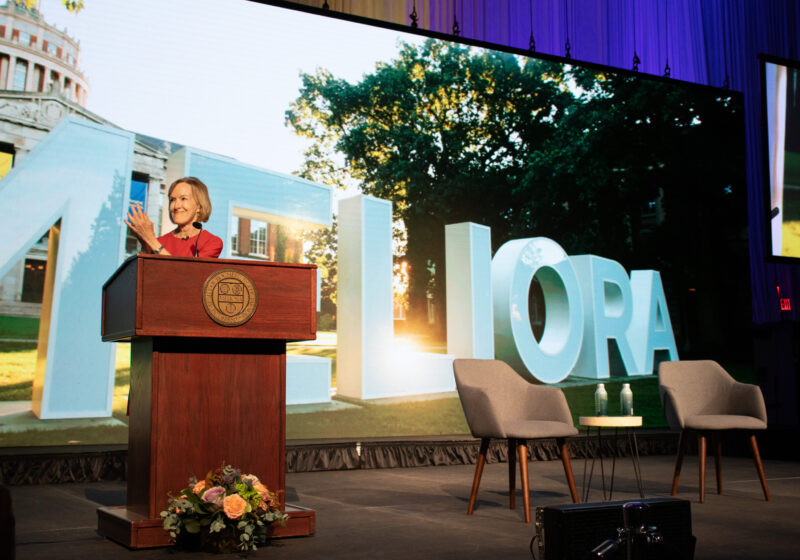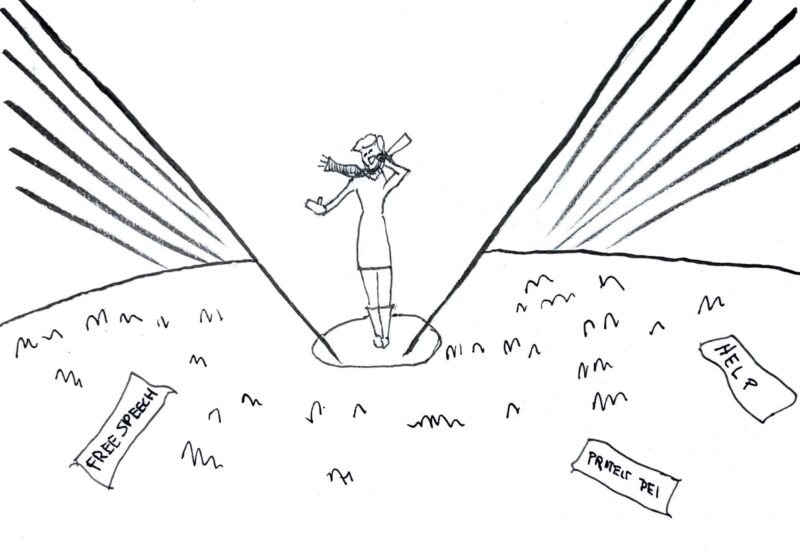After a narrowly-avoided government shutdown and amid chaos in the House of Representatives and war in Europe and the Middle East — Judy Woodruff still has hope.
At her keynote address headlining Meliora Weekend, Judy Woodruff, PBS senior correspondent who has worked prominently in television news since 1976, spoke on the polarized state of the nation, diving into the good, the bad, the ugly — and the future — of American politics.
From stage right through a well-camouflaged door, after welcome remarks by University President Sarah C. Mangelsdorf, Woodruff stepped out to thunderous applause. After some icebreaking quips, the news legend cut to the chase.
“Washington is really messed up,” Woodruff said. “I live there, and I’m going to tell you it’s worse than it looks.”
Briefing on the 2024 election, the 40-plus-year D.C. insider said that the national picture doesn’t look too bright. According to polls, the majority of Americans don’t prefer President Biden or former President Trump.
“It’s going to be dark,” she said. “It’s going to be dirty. It’s time to fasten your seatbelts.”
Woodruff also touched on the collapse of local news, and how that weighs into the national political crisis. When tens of thousands of reporters get laid off and local newspapers are stripped to the bare-bones, Woodruff said public attention turns to the national news — a constant broadcasting of what’s happening in Washington, a constant reminder of the negative.
Through her current journalistic project “America at a Crossroads,” Woodruff has been working to understand why Americans are so divided. Compared to the political climate of the ‘70s, something has changed, she said. The American people have internalized their partisan identities. Differing opinions on legislation, Supreme Court appointees, and all things on the Hill have moved beyond the realm of mere disagreement to the point where members of different parties aren’t able to sit down and talk as people.
“What has been a divide is now a gaping chasm,” Woodruff said.
Woodruff detailed efforts by groups working with ordinary Americans, one at a time, to find solutions to amend the nation’s divide. The goals are to enforce sit-down conversations between people of different parties or with opposing points of view and to encourage reconciliation by putting humanity first and beliefs second. Woodruff’s own project requires 15 months of reporting across the country as she hits small towns and big cities to research and address the divide.
Near the end of her speech, Woodruff had some words of advice for the audience to initiate these conversations with people so different from them for themselves, to create change starting from the ground up.
“Giving people a chance, and get[ting] to know them before we judge them based on their political views, maybe we’re going to find out they’re someone we can talk to, maybe even be friends with,” Woodruff said. “That they’re not a monster.”
During a backstage interview, the Campus Times asked Woodruff about how our college-age generation might think about cutting through polarization and demonization in cases where politics does seem to encroach on personal identity — as is the case with many LGBTQ+, gender-related, and racial issues.
“We’re now working through other issues of identity in our country, and we have to have these conversations, and we can’t help but to feel personal about it,” she said. “As I said, I mean, I think it’s healthy to have these debates. It’s healthy to discuss it. And so I’m not saying you shouldn’t feel deeply about something — whether it’s LGBTQ, trans, whatever it is — but we also need to take a breath and recognize that the other side is not Satan, which is how some of these conversations turn out. But that calls for understanding on both sides.”







